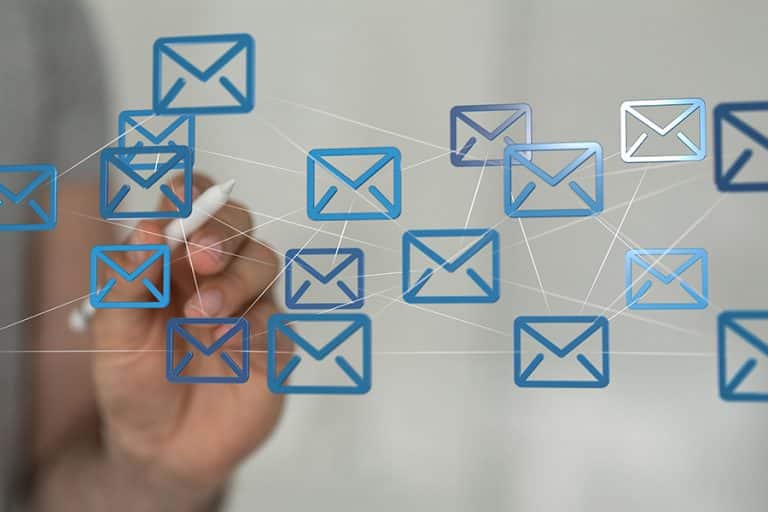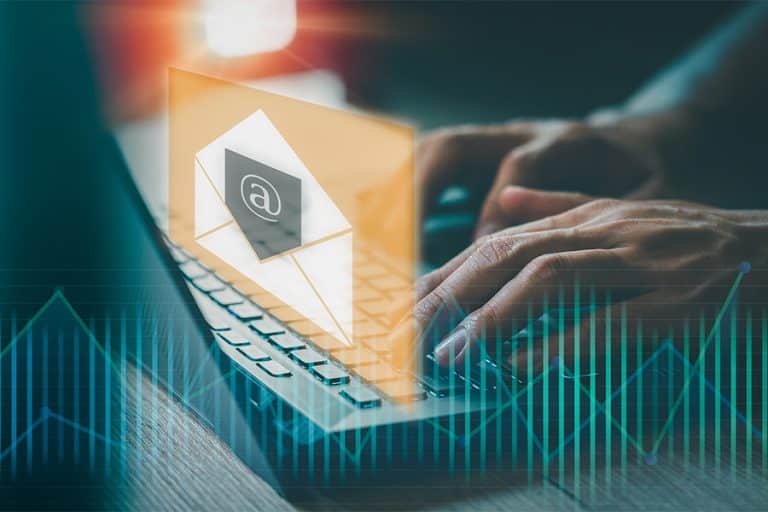This article is written by John Eising, Marketing Automation & Customer Journey Expert and Managing Partner at De Heeren van Veertig Plus (Sponsor van de Email Marketing Automation Summit 2024).
It has not been that long since email started to become commonplace in the business world. In the same 1990s, this form of communication really began to take off.
With the emergence of this new channel, completely new opportunities opened up for marketers. In this article, I will discuss the developments that digital communication has undergone, as we currently stand on the brink of a revolutionary step in the pursuit of greater efficiency, relevance, and personalisation: the application of AI in Marketing Automation.
The SPAM Era: Within the age of Unwanted Messages
The rise of email subsequently marked the beginning of ‘the SPAM era’. During this time, emails were mainly simple advertisements for various dubious products. Such as irrelevant emails about weight loss pills or Viagra. In this era of unwanted messages, the term SPAM was coined: Sending People Annoying Mail. Email was not yet seen as a very serious channel for commercial mass communication, but rather as an irrelevant addition to the traditional marketing tools that could merely be used to SPAM people.
Rise of Personalisation: The Importance of Relevance
Smart marketers quickly recognised the importance of personalisation, and thus the enormous power of using email as a marketing channel. Emails became much more focused on the individual recipient, and became based on personal preferences, purchase history, and behaviour. In other words, the content of emails was tailored to the recipient’s interests.
This shift marked the first steps towards relevance in email marketing. Additionally, because of the measurability of the channel, it could be proved that relevance directly impacted customer engagement. Therefore, the marketeer was finally able to discern a direct correlation between the costs and revenue in terms of conversion rates, leading to the widespread adoption of the term ROI (Return of Investement).
Striving for Relevance: Advanced Segmentation and Targeting
Distinguishing your product or service from the competition has always been an important challenge. This is no different for email: Why would someone give their personal details to receive all kinds of emails from you? Organisations can distinguish themselves by delivering relevant and personalised content, but how do you decide who will receive that content? In other words: Which content is relevant to whom?
The answer to this question was: segmentation. After personalisation of email content became more popular among marketeers, advanced segmentation and targeting techniques were used to deliver the right message to the right person at the right time. This focus on relevance led to further improvements of the final email marketing results.
Rise of Hyper-Personalization: The New Standard
The next phase was characterised by hyper-personalisation, where every interaction with the recipient is utilised to further refine the content and offers. This is not just about using the recipient’s first name in the subject line, but about delivering highly personalised and contextual experiences, which is mainly based on real-time data and machine learning algorithms.
Therefore, instead of merely spamming a costumer with as many products as possible, this enables the marketeer to add relevant products to an email based on, for example, someone’s behaviour on the website, purchase history or clicks in previous emails.
To achieve this, it is important to have access to some important ingredients. First of all, rich and sufficient data is needed in order to make well-informed decisions.
Secondly, there is a need for an adequate platform which is able to interpret this data based on algorithms. Lastly, a solid technical design of email templates and webpages is of great importance to be able to process variable and personalised data.
This will bring you endless possibilities in the use of personalisation and variables, and thus of hyper-personalisation. A dream for the real data-driven marketeer.
Data-driven Marketing Automation
Adding more relevance to your marketing communication might sounds easier than it actually is. How do you make sure that the enormous, and often complex, amounts of data will help you send the right content, at the right time, to the right person? This data driven approach created a need among marketeers to automate such processes. In other words: this sparked the emergence of marketing automation platforms.
A marketing automation tool is able to make decisions based on these enormous amounts of data, coming from various data sources, enabling these tools so often go beyond the human brain. A risk, however, is that this encourages discussions within an organisation. Because what should be trusted? The human gut feeling, or the data?
One thing is certain: both will result in completely different emails.
As an example, if you were a marketeer within the travel industry and someone booked a trip to Ibiza last year, a logical thought is ‘maybe this year they would want to go to Ibiza again’.
When using a data driven approach however, this case is analysed from many more different perspectives. Additional data that is taken into account with such an approach is, for example, which reviews the costumer left after the last vacation, recent click behaviour, or behaviour of comparable costumer profiles, etc. In the end, this could potentially lead to completely different offers presented in the email, compared to those that would have been put in the email based on gut feeling.
As a result, with a data driven approach, some costumers would indeed get the offer to go to Ibiza again, while other costumers will be offered a road trip to the coast of France. In other words, all costumers will get a tailored offer in their email which is based on data.
Omnichannel Marketing is key
As email marketing evolved, the concept of omnichannel marketing emerged alongside it. Omnichannel refers to seamlessly integrating various marketing channels to provide a consistent and personalised experience to customers, regardless of the channel they use. This could then be done via email, social media, SMS, or even in physical stores.
The goal of omnichannel is to optimise the customer journey and increase engagement by delivering an integrated and cohesive brand experience.
Dilemma for the Marketer: Which Tool Is Truly Suitable for Omnichannel?
With the emergence of the omnichannel approach, the need for suitable tools also arose. This has caused, to this day, a diffuse landscape of very diverse platforms all claiming to facilitate omnichannel marketing. However, for the end-user, it is very difficult to assess which tooling is suitable for their organisation.
Indeed, this can potentially lead to misjudgements, resulting in the failure to achieve success with the omnichannel approach.
The Role of AI in Marketing Automation
The development of Marketing Automation has taken a significant leap already, but there is more to come. A recent development is the emergence of AI Agents. Many might immediately think of popular agents such as ChatGPT, Alexa, or Siri, but AI Agents are rapidly integrated in more and more facets of our daily life.
It might not come as a surprise, but even the use of AI in marketing automation is becoming more common. Until now, this often means that AI is used to come up with alternative email subjects or to translate an article. On the other side, I personally believe that AI Agents will soon take over tasks of marketeers.
AI agents are set to play a crucial role in automating and optimising marketing processes across different channels. By analysing large amounts of data, AI agents could generate insights, identify trends, and make predictions about customer behaviours. These insights could then be used to deliver personalised and contextual experiences via different channels, resulting in increased engagement and conversion rates.
Considering the great opportunities AI offers, a commonly asked question then is: will AI Agents take over all the work of the marketeer and in the end replace them? In other words, is AI a threat or will it result in the perfect collaboration between AI agents and the marketeer?
What are AI Agents?
AI agents, also known as AI bots or virtual assistants, are advanced software programs designed to perform tasks in a way that resembles human intelligence. They use various forms of AI, including machine learning and natural language processing, to learn from data, understand context, and make decisions based on complex information.
Unlike traditional bots or chatbots, which are often limited to pre-programmed scripts, AI agents have the ability to learn and adapt to new situations and problems. They can communicate with users via text, speech, or other interfaces, and are capable of performing tasks that were previously only possible by humans.
Not Just Reactive
It is important to note that AI agents are not just reactive, as they can also act proactively. AI agents can anticipate user needs, identify problems before they arise, and take action independently to solve problems or seize opportunities.
To summarise, AI agents represent a new generation of intelligent software that is capable of performing tasks, making decisions, and communicating with users in a way that was previously only possible through human intervention.
The Role of AI-Agents in Marketing Automation
But what role could an AI agent play in Marketing Automation? Is your job at risk because of this? Are we heading towards a landscape where humans are redundant and only AI agents communicate with each other? I personally do not think it will go that far. The key is to use the smart aspects of these agents to optimise your processes, which will enable the marketer to focus on other important tasks.
When used properly, AI-Agents could play a crucial role in automating repetitive tasks. To demonstrate this, I will focus on two important processes: ‘Customer service and support’ and ‘more advanced marketing’.
Improved Customer Service and Support
One of the most obvious applications of AI agents within marketing automation, in my opinion, is that you can significantly improve customer service and support. Availability of these services, first and foremost, is of great importance: twenty-four hours a day, seven days a week. During a time where employee perspectives are changing, while looking for a healthy work-life balance, together with the limited supply in the job market, AI could be a very welcome addition here.
But how can you increase the efficiency of your customer service or support department with AI agents? In addition to continuous availability, I believe response time could play a crucial role. Where you currently have to endlessly press keys and wait on hold, an AI-Agent can assist you within just a few seconds.
If AI agents are provided with rich data, companies could increase the efficiency of their customer service by providing faster response times, 24/7 availability, and personalised, relevant support. Not entirely unimportant to know, through natural language processing, AI-Agents can engage in natural conversations with customers. Therefore, they are able to identify and solve problems, and even answer complex questions without the need for human intervention. Ultimately, this could be the
solution for organisations in the pursuit of improved customer satisfaction, increased loyalty, and lower operational costs for the company.
Automated Marketing Campaigns
In addition to customer service, AI-Agents can be used to automate marketing campaigns. For the majority of marketing departments, setting up a digital marketing campaign still involves a lot of manual work.
The reason why marketeers continue to set up campaigns manually, is often partly due to their insufficient or very limited technical knowledge about marketing automation. At the same time, the technical limitations of tools and the highly fragmented landscape are at the same time reinforcing the difficulty of the marketing automation process as a whole.
Marketeers are often still manually setting up emails, web pages, segmenting target groups, personalizing content, and analysing results. With AI agents, they could largely automate and optimise these processes, which provides the marketeer with valuable time which can be used for things AI agents cannot do.
More Time for the Fun Stuff
So, is AI a threat for the marketeer or rather the perfect colleague. I personally believe marketeers and AI agents could form a great collaboration which will eventually benefit the marketing automation processes in an organisation as a whole.
Based on advanced algorithms and machine learning, AI agents can analyse large amounts of data to generate insights, personalise campaigns based on individual customer needs, and even make real-time adjustments based on changing circumstances. This enables marketers to spend more time on strategic tasks and creative aspects of marketing, while AI agents handle the operational tasks.
A collaboration between the marketer and AI agents could potentially lead to fully optimised campaigns where the technical superiority of AI is combined with the creativity and strategic vision of the marketer.
Currently we are still discovering the opportunities of AI in marketing automation. As with every new development, there are many worries and questions regarding the use of AI. In the end, the success of AI in marketing automation will depend on the marketer being able to use it in such a way that it actually works for them and so they can benefit
from the possibilities. And when that happens, I personally believe that marketing automation can truly ‘work’ for you!
Ook interessant

Vacature: Lid DDMA Commissie E-mail (op vrijwilligersbasis)

Drukte in de inbox: 7 lessen voor piekmomenten in e-mailmarketing


